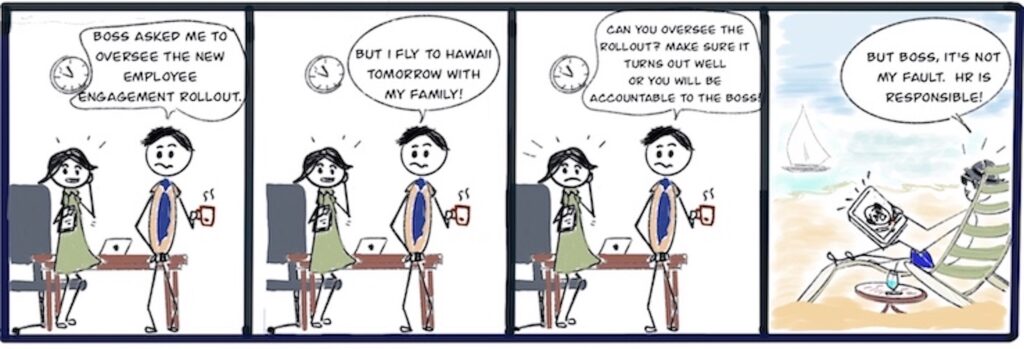Managing is a thinking job. You think about what needs to be improved, what staff need to be developed, how to speed up service or how can I ramp up productivity, for example.
Thinking takes time. A manager who is busy reacting to an inbox all day will not have time to think, research ideas or discuss possibilities with peers.
It is not possible to make time. The clock is not flexible. What can you do then? The only possibility is allocating time wisely.
What we mean about allocating time is, really, choosing what to do and what not to do in the time available.
That leads us to wonder if we, as managers, are doing things that we do not need to be doing. That others can do.
I have been guilty in the early days of my managing life of doing things that others could do better and faster. As I became aware of this I started observing other managers and how they managed and allocated their time. What impressed me most was the way that they were able to ask “Who is going to bell the cat?”
Belling the cat
The mice population was shrinking so they called a community meeting. As they considered the root cause of the problem which they knew was the big fat family cat, they dug deeper and finally realized the problem was that the cat was too quiet and so the mice had little warning.
A brainstorming session followed and the best solution after a vote of the community was to put a bell on the cat. They would hear it coming and voila, the population would be reversed.
By now you know where this is going!
The great mouse leader asked the question: ”OK so who is going to bell the cat?”

A wise manger learns never to say, “leave it to me I will bell the cat” . Rather they ask “OK who’s going to bell the cat?
A manager can delegate work that can be done by direct reports or their staff. A manager cannot delegate those tasks that are theirs by definition, for example, performance reviews and discussions, hiring and firing, achieving results (while work to achieve results can be delegated, accountability for achieving the results cannot be delegated away). More about this in a while.
What can be delegated?

A manager can delegate work that can be done by direct reports or their staff. A manager cannot delegate those tasks that are theirs by definition, for example, performance reviews and discussions, hiring and firing, achieving results (work needed to achieve results can be delegated, accountability for achieving the results cannot be delegated). More about this in a while.
Beware of tasks that you feel you can do better and quicker than your staff. This is a tempting trap which will chew up your time. Often these temptations come as a result of your having been a very good individual contributor before you became a manager. It is your comfort zone. But it is no longer your job.
Also, doing this interesting work yourself deprives your staff of learning and developing their capabilities. A wonderful thing about delegating is that, when correctly delegated to the right person, it can help them develop and feel good about what they have achieved. Selfishly it also sets them up to be more capable and hence, easier to delegate to in the future.

Of accountability and responsibility
I suggest that, as a manager, you apply clear meanings to them as follows:
ACCOUNTABLE – means that the buck stops with you. You cannot delegate this.
RESPONSIBILITY – Can be delegated. It means passing a task and authority to another.
To apply these two thoughts here is an example:
My boss holds me accountable to achieve a productivity improvement of 5%. One of the tasks needed to achieve this result is to take and report on certain measures. I delegate this to a staff member. Let’s say, this task is not carried out and the information needed for decisions about productivity therefore cannot be made. This affects the 5% result needed adversely.
The staff member was responsible to produce the report. He was accountable to me , as his manager, to get it done.
So I hold him accountable for the non-delivery of the report. BUT, I am still accountable to my boss to deliver on the 5%. I cannot say to the boss “Not my fault – talk to my staff member. He did not produce the reports needed. That’s why the 5% was not achieved!”
A manager is like a conductor leading the timing and sounds of the individual orchestra members (the team). If the orchestra does not produce the sound the conductor is looking for, he can only blame himself as he is accountable.

Delegating and Abdicating
Delegating is asking another to take responsibility for a task or result. But the delegator remains accountability.
Abdicating normally refers to a King giving up all his responsibilities and abandoning the throne.
A manager who thinks that delegating is about passing accountability is trying to abdicate. Thinking that if something goes wrong then it is no longer his/her accountability. He is trying to abandon his accountabilities.
A manager cannot abdicate accountability only delegate responsibility for specific tasks and results.
Here are today’s two actions
Action 1: Think: What is my understanding of delegating – is it abdication? Do I still feel accountable?
Do I blame a staff member if he lets me down?
Action 2: Make a sign for your computer screen or desk that says:
“ I am the conductor of this orchestra. Poor sound is my fault.”
Next week: Delegating for results – part one

